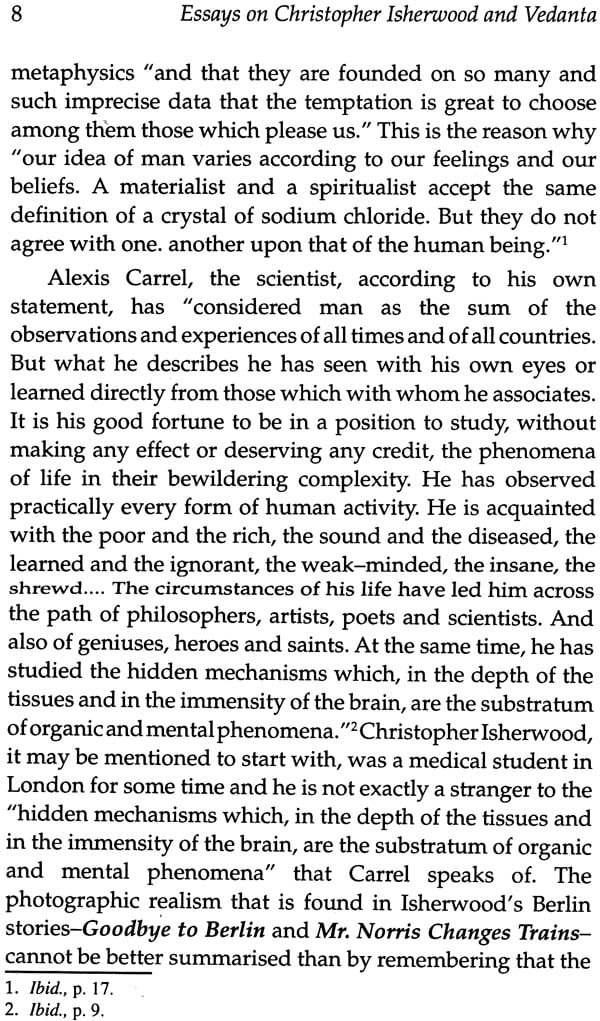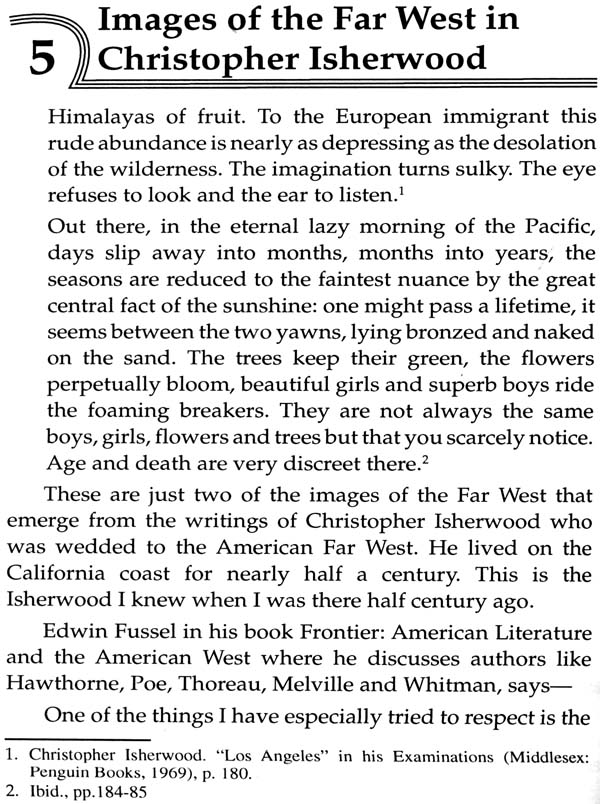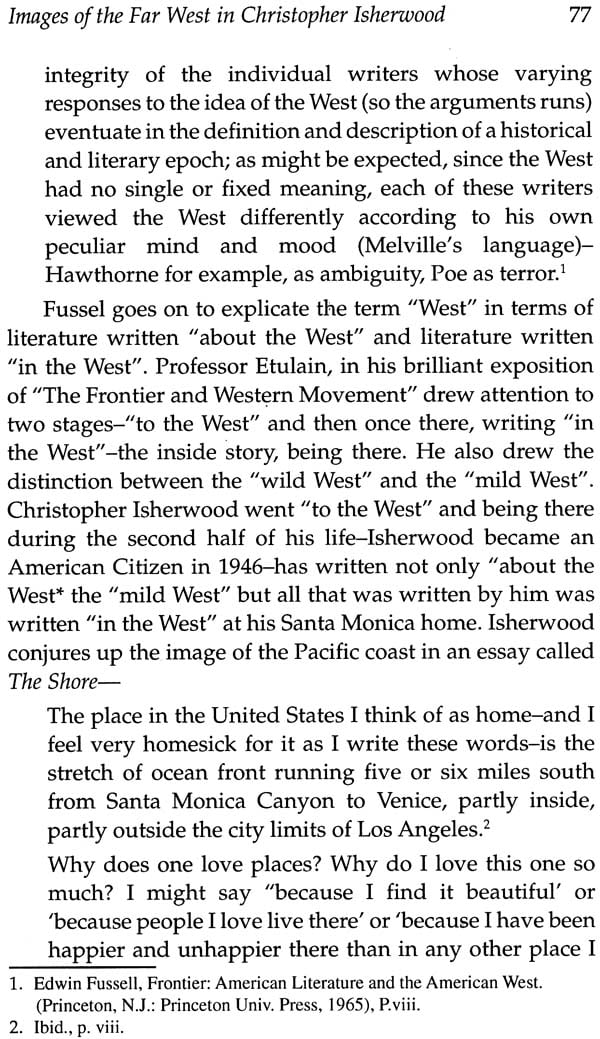
Essays on Christopher Isherwood and Vedanta
Book Specification
| Item Code: | NAP388 |
| Author: | S. Ramaswamy |
| Publisher: | Eastern Book Linkers |
| Language: | English |
| Edition: | 2016 |
| ISBN: | 9788178542966 |
| Pages: | 108 |
| Cover: | Hardcover |
| Other Details | 8.5 inch X 5.5 inch |
| Weight | 270 gm |
Book Description
It was at the Ramakrishna Temple of Hollywood, California that I met Christopher Isherwood for the first time in the early 1960s. I knew about the British Isherwood connected with the Bloomsbury Group in London and as a collaborator of W.H. Auden, when he was a "Leftist". I also knew about the second phase of Isherwood in Berlin as the author of the famous Berlin stories, Goodbye to Berlin. It is this Isherwood who came to California took American Citizenship and settled there in 1947. I was acquainted with the Isherwood who was closely associated with the Vedanta place and with the Journal Vedanta and the West. His biography of Sri. Ramakrishna came out in several installments in this journal and resulted in his book Ramakrishna and his Disciples. He was an ardent student of Swami Prabhavananda and his collaboration with him which resulted in works like the English translations of The Bhagavadgita, Viveka-choodamani and Pathanjali's Yoga Sutras entitled How to Know God made him thoroughly acquainted with the Vedantic concepts and these are the concepts which are enacted in his creative writing in English novels written in California. This is the writing that is examined in this book. Isherwood's strong affiliation with the Ramakrishna Vedanta makes him an “Ishwarvadi”.
S. Ramaswamy obtained his M.A. First Class in English Literature and received Gold Medal from Mysore University in 1954. He was a Fulbright/Smith-Mundt Scholar at the University of California at Los Angeles from 1964 to 1966 and earned an M.A. in American Literature and won the Phi Beta Kappa Award. He was awarded a Ph.D. Degree for his thesis on Tennessee Williams by Bangalore University in 1973. He was a British Council Scholar at Oxford and London, a Senior Fulbright Fellow at California, Texas and Yale and a Shastri Indo-Canadian scholar at McGill University, Montreal. He has been widely published in the areas of American Literature, Comparative Literature and Indological Studies. He has studied Sanskrit traditionally, and is a Follow of Silliman College, Yale University. Mission's Sanyasins and what exactly was meant by their "ashrama names" along with their "Purvashrama" names is astounishing. This would not have been possible without a knowledge of Sanskrit of which he was an adept. For example "Vivekananda" means "spiritial discrimination", "Adbhutananda" means "that which is wonderful", "Advaitananda", means "non—dualism", Turiyananda" means "the fourth state of consciousness" i.e., "Samadhi", "Abhedananda" means "that which has no differentiation; non—dualism", etc. (pp. 218-219 of Ramakrishna and His Disciples). The second characteristic of Isherwood is that though he approaches Ramakrishna with love and devotion just like any Hindu, he deals with his subject in the scientific spirit of a Western investigator. The very opening lines of his book are worth quoting—
This is the story of a phenomenon. I will begin by calling him simply that, rather than 'holy man', 'mystic', 'saint', or 'avatar' all emotive words with mixed associations which may attract some readers, repel others. A phenomenon is often something extraordinary and mysterious. Ramakrishna was extraordinary and mysterious; most of all to those who were best fitted to understand him. A phenomenon is always a fact, an object of experience. That is how I shall try to approach Ramakrishna. This is a typical Isherwood's introduction to any of his works. The third way in which his book is special arises from the fact that he visited India twice and placed himself mentally in the actual atmosphere and surroundings in which Ramakrishna lived as has been pointed out by the publisher of his book. The Bibliography that Ishwerwood gives at the end under various headings shows his complete understanding and mastery over his subject—“About Ramakrishna”, “about Sharada Devi”, “About Ramakrishna’s Disciples”, Historical background”, “Social background”, Philosophical and Religious” and Reference Books”. Indeed, he mention both the aforesaid books b Max Muller and Roman Rolland. Ishwarwood is well known for his thorough and meticulous research.
The Bibliography itself is extremely well written and is quite comprehensive. From the birth of Ramakrishna to the last year of his life, the narrative deals with his boyhood, his early days at Dakshineswar and the Vision of Kali, the coming of disciples, naren, the young monks and some great devotees. It is this close spiritual association with Ramakrishna Vedanta that is reflected in ishwarwood’s Ramakrishna and his disciples and other Vedantic texts.
Contents
| Introduction | 1 |
| A Selection of Texts on which the Interpretation is Based | 5 |
| Man, the Unknown (Alexis Carrel and Christopher Isherwood | 7 |
| Discovering the Self : Christopher Isherwood's DOWN THERE ON A VISIT as A Religious Novel | 18 |
| On the Renunciation of the Non-Self: Christopher Isherwood's A MEETING BY THE RIVER | 36 |
| The Theme of Self-Enquiry in the ·Californian Novels of Christopher Isherwood | 49 |
| Images of the Far West in Christopher Isherwood | 76 |
| Auden-Isherwood Collaboration: A Personal Recollection on Auden's Centenary | 87 |
| An Epitaph for Christopher Isherwood | 95 |
| Appendix | 104 |









